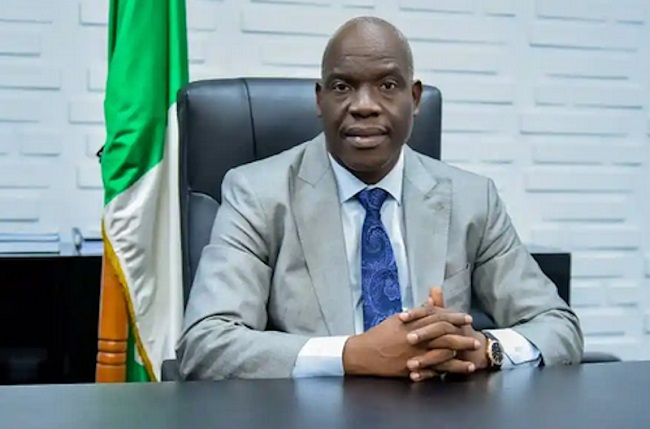Komolafe: Nigeria Lost $1bn Revenue To Crude Oil Theft In Q1

- World’s richest billionaires lose $1.4tn in worst half-year ever
Nigeria lost $1 billion in revenue during the first quarter of this year due to crude oil theft, the Chief Executive Officer of the Nigerian Upstream Petroleum Regulatory Commission (NUPRC), Mr. Gbenga Komolafe, said at the weekend, warning that the development was a threat to the country’s economy.
This is coming as the world’s 500 richest people lost $1.4 trillion in the first half of this year, a dizzying decline that marks the steepest six-month drop the worst ever for the global billionaire class.
Nigeria loses millions of barrels of crude oil a year because of theft and vandalism, including the tapping of crude from a maze of pipelines owned by oil majors.
Komolafe, according to Reuters, said that of the 141 million barrels of oil produced in the first quarter of 2022, only about 132 million barrels of oil were received at export terminals.
This indicates that over nine million barrels of oil were lost to crude oil theft … this amounts to a loss in government revenue of about $1 billion … in just one quarter,
Komolafe said in a statement.
This trend poses an existential threat to the oil and gas sector and by extension, the Nigerian economy if not curbed,
he added.
Crude oil theft has increased to a daily average of 108,000 barrels in the first quarter of 2022 from 103,000 barrels in 2021, the NUPRC boss noted.
The theft has resulted in the declaration of force majeure at Bonny Oil & Gas Terminal, a pipeline transporting crude from the oil-rich Niger Delta to export vessels, among others, creating a hostile environment and disincentive to investors.
President Muhammadu Buhari had pledged to ensure that oil theft is stopped and had set up dedicated courts to combat the problem, but it persisted.
Minister of State for Petroleum Resources, Mr. Timipre Sylva, said last week he expected to see some improvement in security in the sector, enabling Nigeria to meet its Organisation of Petroleum Exporting Countries (OPEC) production quota by the end of August.
Meanwhile, a three-million-barrel cut to daily supplies would push benchmark crude prices to $190, while the worst-case scenario of five million could mean “stratospheric” $380 crude, JPMorgan Chase analysts have said.
This, the group said would likely happen if US and European penalties prompt Russia to inflict retaliatory crude-output cuts.
World’s Richest Billionaires Lose $1.4tn in Worst Half Year Ever
In another development, the world’s 500 richest people lost $1.4 trillion in the first half of this year, a dizzying decline that marks the steepest six-month drop ever for the global billionaire class.
Elon Musk’s fortune plunged by almost $62 billion, Jeff Bezos saw his wealth tumble by about $63 billion while Mark Zuckerberg’s net worth was slashed by more than half in Q1, 2022, the Bloomberg Billionaires Index, has indicated.
It’s a sharp departure from the previous two years, when the fortunes of the ultra-rich swelled as governments and central banks unleashed unprecedented stimulus measures in the wake of the COVID-19 pandemic, juicing the value of everything from tech companies to cryptocurrencies.
With policymakers now raising interest rates to combat elevated inflation, some of the highest-flying shares – and the billionaires who own them – are losing altitude fast.
Tesla Inc. had its worst quarter ever in the three months through June, while Amazon.com Inc. plummeted by the most since the dot-com bubble burst, a Bloomberg report said.
Though the losses are piling up for the world’s richest people, it only represents a modest move toward narrowing wealth inequality.
Tesla’s co-founder, Musk, still has the biggest fortune on the planet, at $208.5 billion, while Amazon’s Bezos is second with a $129.6 billion net worth, according to the index.
France’s richest person, Bernard Arnault, ranks third with a $128.7 billion fortune, followed by Bill Gates with $114.8 billion.
They are the only four that are worth more than $100 billion, at the start of the year, 10 people worldwide exceeded that amount, including Zuckerberg, who is now 17th on the wealth list with $60 billion.
Changpeng Zhao, the crypto pioneer who debuted on the Bloomberg Billionaires Index in January with an estimated fortune of $96 billion, has seen his wealth tumble by almost $80 billion this year amid the turmoil in digital assets.
Vladimir Potanin, Russia’s wealthiest man with a $35.2 billion fortune, acquired Societe Generale SA’s entire position in Rosbank PJSC earlier this year amid the fallout from Vladimir Putin’s invasion of Ukraine.
He also bought out sanctioned Russian mogul Oleg Tinkov’s stake in a digital bank for a fraction of what it was once worth.
Sam Bankman-Fried, Chief Executive Officer of crypto exchange FTX, bought a 7.6 per cent stake in Robinhood Markets Inc. in early May after the app-based brokerage’s share price tumbled 77 per cent from its hotly anticipated initial public offering last July.
The 30-year-old billionaire has also been acting as a lender of last resort for some troubled crypto companies.
The most high-profile buyout of all belonged to Musk, who reached a $44 billion deal to buy Twitter Inc. He offered to pay $54.20 a share; the social-media company’s stock traded at $37.44 at 10:25 a.m. in New York.
The world’s richest man said in an interview with Bloomberg News Editor-in-Chief John Micklethwait last month that there are “a few unresolved matters” before the transaction can be completed.
There’s a limit to what I can say publicly,
he said.
It is somewhat of a sensitive matter,
he added.

Justin Nwosu is the founder and publisher of Flavision. His core interest is in writing unbiased news about Nigeria in particular and Africa in general. He’s a strong adherent of investigative journalism, with a bent on exposing corruption, abuse of power and societal ills.













